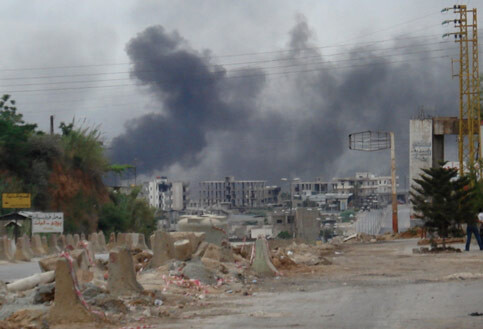Beirut 2 June 2007

The northern entrance of Nahr al-Bared Refugee Camp, under fire from Lebanese forces. (Dr. Marcy Newman)
1 June 2007
For the past 800 and some odd days in Lebanon, especially in Rafiq Hariri strongholds, there have been signs counting the days until “the truth” (al-haqiqa) is learned about Hariri’s assassination (in other words, until Syria can be blamed). This “truth” seems to be the only one that matters in Lebanon right now.
Since early morning U.S. weapons have bombarded the Nahr al-Bared refugee camp in northern Lebanon, though no one can get a clear idea about what exactly is happening there. On the news we watched bombs going off every few seconds all day long with huge clouds of black smoke smoldering in the sky. A journalist friend who was trying to photograph the scene called me and asked me to bring him more equipment from his home in Beirut. Since I needed to deliver medicine to Nahr al-Bared refugees in Bedawi refugee camp I drove his equipment up to Nahr al-Bared where he was trying to take pictures.
I brought one of the Nahr al-Bared Relief Campaign workers with me so that I wouldn’t be alone. We drove up the highway towards the Syrian border along the Mediterranean Sea. Everything was still and quiet along the highway — peaceful, one might dare say — until we heard a bomb go off on the eastern side of the highway. We did not know, at the time, that we had just entered the area along the southern entrance to Nahr al-Bared refugee camp. What we heard, and the smoke that we saw, was actually from the Lebanese army shooting across the highway into Nahr al-Bared camp. We continued up the highway, passing through an increasing number of checkpoints until we were stopped by the army near a bakery. We saw a crowd of photojournalists who had also been stopped by the army. They were prohibited from shooting film footage of what was going on in the camp and were forced to stay some two to three kilometers from the area where the army was directing its new U.S. donated artillery. Some reported being shot at by the army earlier in the day. All of them (Lebanese and internationals alike) complained of the army inhibiting them from telling the story of what is actually happening in Nahr al-Bared refugee camp. For a country with signs declaring “the truth” everywhere you look it seems rather ironic that journalists are prevented from witnessing the events unfolding before them.
Throughout the day we heard that two Lebanese soldiers were killed and that twelve “terrorists” were also killed. How they know these figures is perplexing, but what is particularly disturbing is that somehow the fact that 15,000 Palestinians still trapped inside this camp are completely absent from the news coverage of the story inside Lebanon (and I gather outside as well). Somehow the fact that there will be Palestinian civilians indiscriminately killed because of this incessant bombing escapes the media’s attention.
The area where we waited for my friend in between the northern and southern border of Nahr al-Bared refugee camp, on main highway leading the Syrian border, remained eerily still for the hour we stood there. We watched among the journalists as the bombs flew overhead from behind us into Nahr al-Bared camp worried about the Palestinian lives lost in this military mission. The stillness of the early evening hours intensified the sounds, smells, and sights we saw and felt — the black clouds of smoke, the earth shaking beneath our feet, and the fires burning in the distance as a result of the bombardment.
When we finally reached Badawi camp to deliver the medicine we were learned that one refugee from Nahr al-Bared camp, who passed through a checkpoint earlier today, was told by a Lebanese soldier, “I hope that we can round up all the Palestinians, throw benzene on you, and light a fire.” This is a truth that Lebanon does not want told. These are the stories that must be told and they far outweigh and out number the story of one prominent, wealthy Lebanese leader’s international tribunal.
Dr. Marcy Newman is a Visiting Professor at the Center for American Studies and Research at the American University of Beirut and a Fellow at the Initiative for Middle East Policy Dialogue.
For more information please email Marcy Newman at marcynewman at gmail.com.
Related Links





